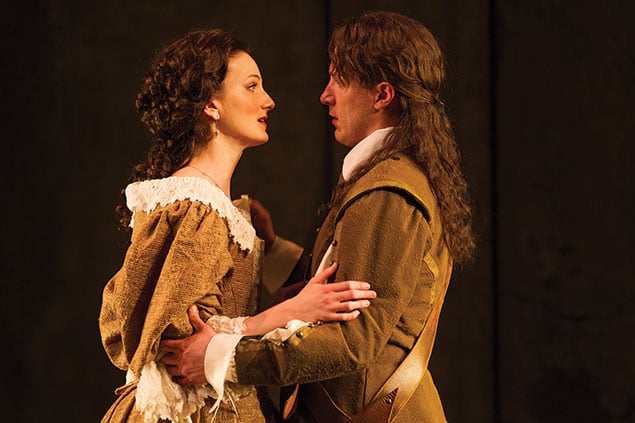
Ego, testosterone, and a position of political or military power can be a catastrophic
combination. Even centuries before Kim Jong Un embarked on his most recent nuclear
pissing match, German playwright Friedrich Schiller captured this age-old truth in
his work. Grasping themes of loyalty, betrayal, and ruthless ambition with iron fists,
Schiller’s
Wallenstein, translated and adapted for its American premiere by former poet laureate
Robert Pinsky, is now storming the stage at the Shakespeare Theatre Company’s Sidney Harman Hall.
It’s a traditional take on a traditional but timely topic—loyal soldiers and colleagues
basking in the glow of their heroic commander’s glory are blinded to the merciless
actions he’s taken and continues to take to secure his exalted station, while duplicity
and backstabbing among followers and fellow countrymen further blurs the line between
friend and foe.
The 1799 work, set amid the turmoil of Europe’s 17th-century Thirty Years’ War, is
appropriately playing in repertory with Shakespeare’s own power-trip-laden tragedy
of the same era,
Coriolanus, as part of the 2012 Regional Theatre Tony Award-winning company’s Hero/Traitor series
with plenty of dramatic and artistic overlap between the two productions. Pinsky’s
“freely adapted”
Wallenstein script, paired with STC artistic director
Michael Kahn’s grand direction makes for a striking, if straightforward, show that raises poignant
questions about the price of greatness.
In one of the title character’s earliest monologues, the cocky Duke of Friedland,
Albrecht Wallenstein (a fittingly commanding
Steve Pickering), brags that his legendary military might has resulted in a modern-day board game
in his honor (“freely adapted” in this case really does mean freely adapted). And
it’s that same spirit of callous competition and cunning strategy that seeps into
the production’s overall feel. Cold, imposing sets and costumes, designed by
Blythe R.D. Quinlan and
Murell Horton, respectively, are all steel and concrete and armor. Stark lighting choices and sleek
sliding set pieces reinforce the calculated, tactical atmosphere with understated
impact. The deceptive commander effectively plays his allies and enemies like pawns,
not knowing that all the while trusted generals and diplomats are devising their own
moves against him, and the sharp staging makes the two-faced dealings all the more
powerful.
With what feels like an army of a cast, artistically and literally, keeping characters
and storylines straight in the play’s earliest scenes can get daunting. (The program
includes a handy synopsis that’s worth reading over before the lights go down.) But
as the story builds, the solidity of its actors grows more apparent, as well. Pickering,
not surprisingly, leads the pack with his nonchalant asides to the audience and controlled
balance of charm and intimidation. The seasoned actor’s raging outbursts, though few
and far between, are especially chilling fun. As Wallenstein’s deceitful and power-hungry
former ally Octavio Palladini, a statuesque
Robert Sicular is satisfyingly devious. The cast all around lives up to the production’s lofty ambitions
without charging overboard as it easily could in so sweeping a narrative, with a select
few actors offering particularly captivating scenes.
Derrick Lee Weeden’s booming delivery as loyal general Kolibas, for example, is a fitting complement
to cannon fire that penetrates the action. Stealing one haunting scene, a pale and
bloodied little boy (Colin Carmody), swaying and backlit in eerie green light, represents the ghostly victims of the
seemingly never-ending war.
Bringing old-fashioned greed, narcissism, and power struggles to life on stage is
hardly new territory to invade—in fact, it’s as classic as it gets—but when done right,
as in this show, the effect remains. “Once men have climbed the heights of greatness,”
Wallenstein says, “ . . . the world forgets the things that got them there.” It’s
this ever-relevant message of moral ambiguity and the gray area of heroism that comes
across here. The play in and of itself promises epic results, with legendary characters,
larger-than-life warfare, and even a sword fight or two for good measure, and epic
results it delivers.
Wallenstein is at the Shakespeare Theatre Company’s Sidney Harman Hall through May
31. Tickets ($43 to $105) are available via the website.


















